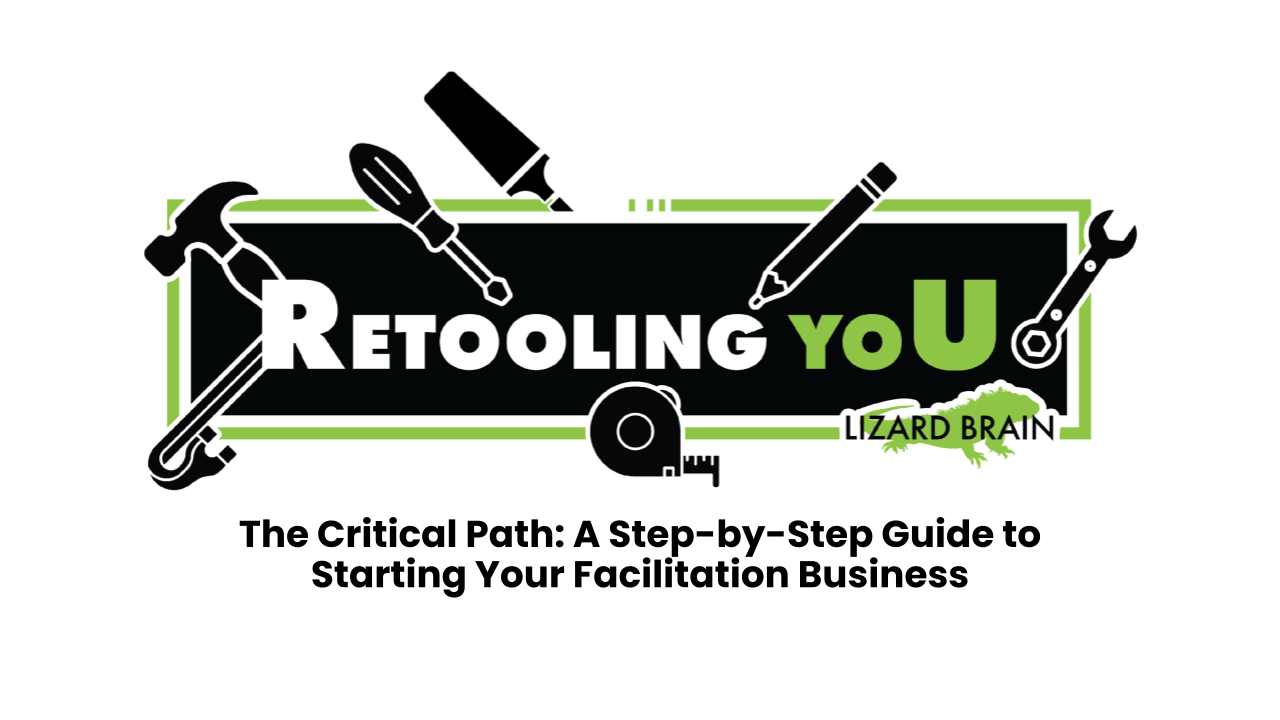The Critical Path: A Step-by-Step Guide to Starting Your Facilitation Business
Starting a facilitation business is an exciting and rewarding venture. Facilitators have the ability to help people collaborate, share ideas, and make decisions: all essential for solving problems and advancing projects. But launching your own business in this field requires careful planning and prioritization. Whether you're transitioning from another career or building on an existing skill set, crafting a solid roadmap is crucial to your success.
Here we’ll outline the critical steps to help you build your facilitation business from the ground up, organized into a clear and actionable timeline. From initial setup to scaling your practice, each step includes practical tips to keep you focused and inspired.
It’s time to get started on your facilitation business journey.
Step 1: Lay the Foundation
What to Do First
Before anything else, take some time to explore why you want to start a facilitation business. Is it the flexibility? A strong passion for helping people work better together? Understanding your motivation will keep you grounded as you build your business.
Define Your Niche
Facilitation is a broad practice. Are you drawn to corporate team-building? Community engagement? Project planning? Identifying who you want to serve will give your business clarity and direction.
Get Equipped
Set yourself up for success by learning facilitation best practices. If you’re not already certified, consider programs like the International Institute for Facilitation (INIFAC) certifications or virtual facilitation courses. These credentials sharpen your skills and boost your credibility.
Handle Legalities
Register your business name, apply for a local license, and decide on a business structure (e.g., LLC or sole proprietorship). I think it’s a good idea to see what URLs are available FIRST, then decide your business name and file for the legal entity based on your website.
Pro Tip:
Kick off your planning with a facilitated activity…on yourself! This will help you brainstorm ideas, prioritize tasks, and get valuable practice using your facilitation tools.
Step 2: Build a Brand
What to Do Second
Once your foundation is in place, it’s time to get people excited about your business. Building a recognizable and trustworthy brand will distinguish you in a competitive market.
Create a Memorable Brand Identity
Develop a logo, choose a color palette, and craft a tagline that reflects your mission. Your brand should communicate professionalism, clarity, and the value you bring to clients.
Launch a Website
Your website is your business’s online home. Include an overview of your services, an “About” page to introduce yourself, and a compelling call to action to help visitors connect with you.
Leverage Social Media
Social platforms are a cost-effective way to grow awareness for your work. Share posts like client testimonials, behind-the-scenes of your process, and facilitation tips to position yourself as an expert in the field.
Pro Tip:
Start blogging about your insights as a facilitator. Share knowledge generously; this not only attracts potential clients but also establishes your authority in the industry.
Step 3: Gain Experience and Clients
What to Do Third
Clients are the lifeline of your business, and acquiring your first few is the next step toward success.
Network Strategically
Reach out to past colleagues, attend local networking events, or join groups like the International Association of Facilitators to meet potential clients and partners.
Offer Introductory Workshops
A cost-effective (or free) workshop can demonstrate your expertise and help people see your facilitation work firsthand. End these sessions with an invitation to schedule a paid session or consultation with your business.
Ask for Referrals
Word of mouth is powerful in the facilitation field. If you’ve helped someone effectively, don’t shy away from asking them to refer you to others.
Pro Tip:
Prioritize small wins. Focus on delivering excellent results for your early clients and building testimonials that you can feature on your website and marketing materials.
Step 4: Expand and Scale
What to Do Last
Once you’ve established your business and gained traction, it’s time to think about scaling your practice to grow revenue and reach.
Develop New Offerings
Can your facilitation business branch into online workshops? Team retreats? Licensing intellectual property, like tools or frameworks, can also diversify your income streams.
Focus on Efficiency
Invest in tools to streamline your processes. Facilitation platforms like MURAL and Miro can help you scale virtual workshops, while business management tools like QuickBooks or HubSpot simplify administrative tasks.
Invest in Ongoing Learning
Stay sharp by attending advanced facilitation courses, joining webinars, or reading the latest books on team dynamics and decision-making.
Pro Tip:
Collaborate with other facilitators. Jointly running a workshop not only expands your audience but also reduces the workload.
Incorporating Facilitation into Your Planning
Throughout every stage of building your business, facilitation can be a powerful tool to keep you organized and on track. Practicing what you preach is key—whether it’s mapping out your goals, assessing risks, or brainstorming future service ideas. Facilitation activities naturally drive collaboration and clarity, and using them for your internal planning shows potential clients that you live and breathe what you teach.
Mentorship
Launching a facilitation business requires determination, planning, and adaptability. By organizing your to-dos into a structured timeline, you can tackle the process step by step, without feeling overwhelmed. Remember to focus on building relationships, showcasing your skills, and continually growing your expertise.
The most rewarding part of facilitation is helping others unlock their potential. Your business can do just that, whether it’s in a boardroom, a Zoom call, or a community hall. Here's to building a practice that not only changes your life but also positively impacts the lives of those you work with. Take the first step today. You’ve got the skills and the drive to succeed. Contact us today to learn about our mentoring program.
Watch this episode of Retooling yoU for more information about The Critical Path. Need help putting a plan into action
check-out the Innovation Co-Pilot.

